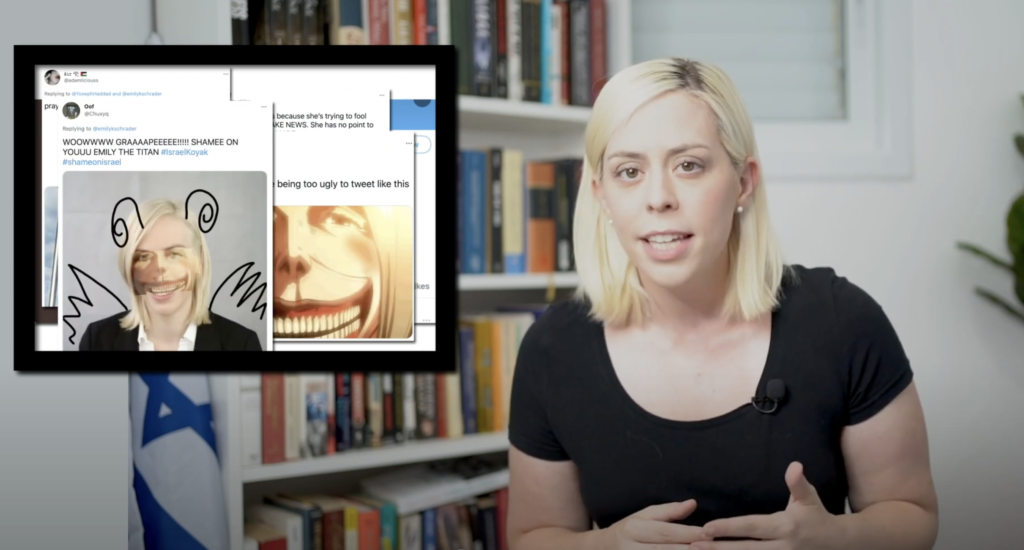Australia/Israel Review
The price of being a Zionist woman on Twitter
Jul 28, 2021 | Emily Schrader

In May, while 4,500 rockets from Gaza were flying at Israeli schools, homes, and businesses, another war against the Jews was brewing abroad. The Anti-Defamation League (ADL) reported that, in only eight days after the conflict kicked off, antisemitic incidents rose by 75%. In London, anti-Israel activists drove around Jewish neighbourhoods screaming from their cars to “rape their daughters”; in Florida, Jews were targeted by pro-Palestinian activists who threw garbage at them while screaming “Free Palestine! … We’re going to rape your wife”; and in New York, pro-Palestinian protestors threw fireworks at Jews in the Diamond District. The scenes are jarring, but given the rhetoric accompanying them online, they are hardly surprising.
As someone with over a decade of experience in the digital marketing side of Israel advocacy, I can honestly say I’ve never seen an outpouring of explicit antisemitic, not “anti-Zionist”, content across social media platforms as strong as what we witnessed in May. For years, Jews and pro-Israel activists warned that ignoring antisemitism couched as anti-Zionism would lead to violence against Jews. The past few weeks have proven that argument to be sadly true. There is a direct correlation between real-world violence and the level of hate we see online – making it all the more alarming that the rhetoric against Jewish women is even more radically perverse and aggressive.

Fireworks attack upon Jews in New York (Source: Twitter)
The immediate response to Israel’s operation in Gaza was a barrage of online antisemitism. Jews were attacked with thousands of “free Palestine” comments, even when not talking about Israel or the conflict. Teens on TikTok were spammed and harassed by anti-Israel activists accusing them of supporting “genocide” and “apartheid.” Instagram became a hostile environment for Jews thanks to influencers such as Bella and Gigi Hadid, who used their collective 100 million followers to spread extremist rhetoric about Israel. Subsequently, the ADL reported that the same week that “Hitler was right” was trending on social media—with over 17,000 mentions —and as mentioned above, there was also a 400% increase in antisemitic activity around the world.
The situation was even more extreme for female activists such as myself. That is not to say that male activists did not receive threats or harassment, but the viciousness of attacks against women on social media was of a different nature entirely. For one, I was targeted by Malaysians who tweeted over 100,000 times with personal insults about my appearance and dozens of poor-quality memes ranging from laughably absurd to deeply violent. Of course, I received dozens of Hitler pictures and calls to “kill the Jews,” but I also had multiple fake accounts made in my name, which were tweeting and tagging people who follow my verified account, saying, “I’m the real Emily Schrader. I’m a slut.”
In addition, my email was leaked, and I received multiple detailed death threats with sexually explicit descriptions of how they would attack me. There was a public call to hack my social media accounts and website. My Instagram and Twitter DMs (direct messages) exploded with hundreds of messages calling me names, threatening rape, and making otherwise sexist and outrageous comments such as, “Go suck Netanyahu’s ball [sic] … Hey slut I will bomb your house.” Another stated, “Your vagina is so dirty and disgusting, I can assure that it was a rape of an Israeli dog [sic].”
I share these vile comments not to give them attention, as some have counselled me not to do, but to draw attention to the larger problem: These comments are not out of the ordinary for a Jewish woman to receive on social media. Today there is no greater social media “crime” than being a Jewish or pro-Israel woman.
In the pro-Israel world, there are few vocal female voices. This, again, is not a coincidence. Personally attacking and threatening women is a method of silencing their voices, online and in real life, and deterring new ones from speaking up. “With women there are no boundaries … The most common comment I get is sharmuta (“whore” in Arabic),” said TikTok influencer Shai Emanuel Yamin. “I saw men also suffering from hate comments, but it’s never about how they look or what they wear.”
Liora Rez, the founder and executive director of Stop Antisemitism, agreed that the online attacks against women are more personal: “From the most deranged rape threats to the doxxing (publicly revealing private personal information) of my parents’ information, antisemites have no boundaries when it comes to harassing female Jewish activists online.”
To be clear, it’s not just Jewish women being targeted. Yasmine Mohammed, an ex-Muslim and women’s rights activist with over 100,000 Twitter followers, has been the target of gender-based hate comments for years after speaking against antisemitism. In response to the Israeli-Gaza conflict, she tweeted, “I’m normally inundated with death threats, but these past couple of weeks, it’s been more vicious than ever.” In conversation, she told me, “The explosion in the intensity of hate that I receive when I speak up in support of Israel or against antisemitism … no one can ever get used to that.”
We cannot continue to shrug our shoulders and say “Just ignore it,” because the results, as we’ve already seen for Jews, can very rapidly escalate into real-world violence. Harassing women, launching public smear campaigns, levying threats of sexual violence – these are actions with real consequences that should have no place on social media, and every social media platform should have a zero-tolerance policy toward such virulent abuse.
Yet, despite the myriad risks, as Jewish and pro-Israel female voices, we must not back down in the face of cyberbullying. Instead, we must elevate female voices and encourage new voices to join the conversation and help fight back.
As Rez put it, “Antisemites just failed to realise that their hatred and obscenities do nothing but motivate me to continue and amplify what I’m doing.” It’s draining to be on the receiving end of such abuse, but it also reaffirms that what we are fighting for is worthwhile, and more important than ever before.
Emily Schrader is the CEO of Social Lite Creative LLC. This article is reprinted from Tablet Magazine, at tabletmag.com, the online magazine of Jewish news, ideas, and culture. © Tablet Magazine, reprinted by permission, all rights reserved.
Tags: Antisemitism, Israel, social media






